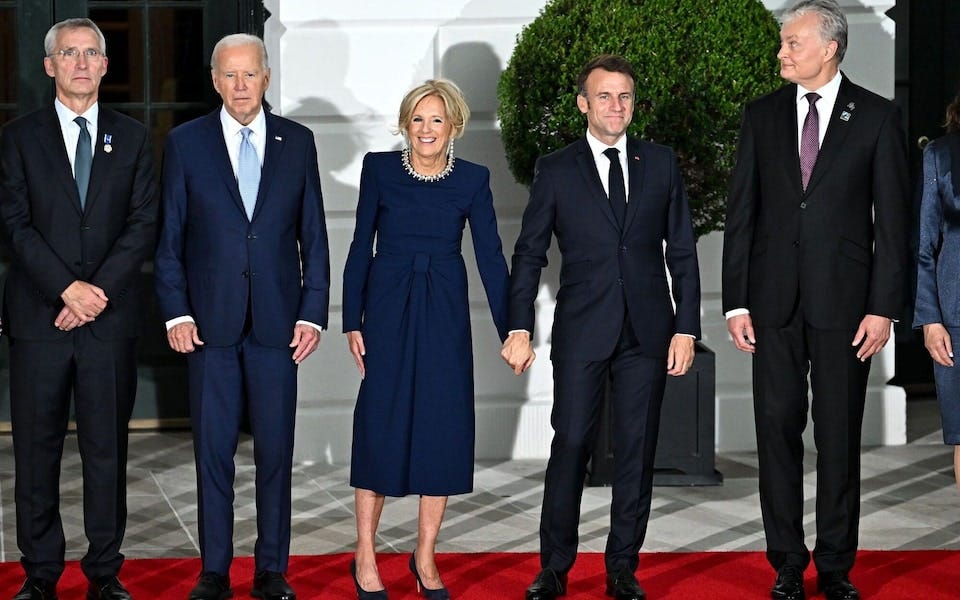Does NATO Make the World a Safer Place?
The Alliance Renews Commitment to Escalating Wars and Tensions Across the Globe

The NATO Summit enters its last day in Washington, DC on 11 July. One of the key topics for this gathering of NATO leaders is “deterrence and defense.” However, as NATO leaders ship more weapons towards the war in Ukraine, trade barbs with China, and push member nations to spend more money on defense, the ongoing summit begs the question, does NATO make the world a safer place?
The war between Russia and Ukraine has passed its two year mark. Even in the first few days of the summit, NATO leaders seem to be doing whatever possible to prolong the war even longer. The alliance has begun shipping F-16 fighter jets to Ukraine to use in the prolonged war, a decision which Russia heavily denounced. “This is evidence that Washington is leading a war gang,” Russian Foreign Ministry spokesperson Maria Zakharova told Russian news agency TASS. Supplying the Russia-Ukraine conflict with more and more weapons on the Ukrainian side has long been NATO policy since the outbreak of the war in February of 2022. In fact, it was NATO’s eastward expansion that ignited tensions that led to the war in the first place.
Accusations hurled at China
NATO leaders are also trading barbs with China, with 32 member countries signing off on a declaration which accuses China of enabling the war in Ukraine through its “no limits partnership” with Russia. The declaration also levels the same accusations against North Korea and Iran. China “has become a decisive enabler of Russia’s war against Ukraine,” the NATO members state.
China responded with a statement from a spokesperson from the Chinese mission to the European Union, who articulated that “China’s core position on the Ukraine issue is to promote peace talks and political settlement, which has been widely recognized and appreciated by the international community.” China has long pushed for a negotiated end to the war in Ukraine, while the West has been lambasted by many for openly blocking negotiations between Russia and Ukraine.
NATO also accused China of posing “systemic challenges to Euro-Atlantic security” and engaging in “coercive tactics and efforts” to sow division between member states. These accusations come in the context of Western powers attempting to draw nations in the Asia Pacific region into their sphere of influence. North Korea in particular has been critical of countries such as the United States for pushing for an Asian alliance that could look like the Asian version of NATO, which would stand against the sovereignty and development of nations such as the DPRK and China.
Alliance demands more military spending
NATO members, especially the US and the UK, are pushing for member nations to spend even more of their GDPs on defense. 23 US Senators from both parties sent a chastising letter to Canada, which spends 1.34% of its GDP on its military. The United Kingdom spends just over 2% of its GDP on its military, and the US spends almost 3.5%. The NATO alliance requires member countries to spend at least 2% of their GDPs on their military budgets.
“We are concerned and profoundly disappointed that Canada’s most recent projection indicated that it will not reach its two percent commitment this decade,” the US senators wrote. US Speaker of the House of Representatives Mike Johnsons called Canada’s spending mark “shameful”.
“Talk about riding America’s coattails,” he said.
UK Defense Secretary John Healey is pushing NATO members to go even beyond the 2% defense spending mark. “Any assessment of the growing threats that we face and the global instability suggest that all NATO nations are going to need to do more than simply two percent,” Healey told reporters while attending the summit.
The 2% spending target has consistently been unmet by nations such as Italy, which is also under pressure to raise its defense budget. Italy’s membership in NATO has long been a point of contention with the Italian left. “Meloni flew to Washington to promise more money for military spending until the target of 2% of GDP is reached,” Italian national spokesperson of Potere al Popolo Giuliano Granato told Peoples Dispatch.
The Italian left has priorities other than more spending on defense, however. “To make our peoples safer, we would need to stop foraging the military-industrial complex and meet the need for health security, including more doctors and hospitals, economic security, including minimum wage and no more precarity, environmental security, including a real ecological transition,” Granato articulated. In a previous interview with Peoples Dispatch, Italian political scientist Giuliano Brunetti likened NATO’s heavy presence in Italy to a military occupation.
Granato denounced Meloni for acquiescence to NATO’s demands. “When it is the NATO belligerent organization we stand at attention and obey,” he said.
Maurizio Coppola, also of the Italian left organization Potere al Popolo, warned of the new set of revised rules of the European Union’s Stability and Growth Pact, to be implemented in 2025. According to Coppolo, this will force EU nations to reduce social spending, “because NATO is still forcing Europe and the European institutions to invest more in the military industrial complex.” The Italian left organizations must prepare for the resulting crisis arising from the contradiction between lower social spending and higher military spending, Coppola argues.
As the NATO Summit comes to a close, the calls for the alliance to disband continue in Europe, the US, and throughout the world.



